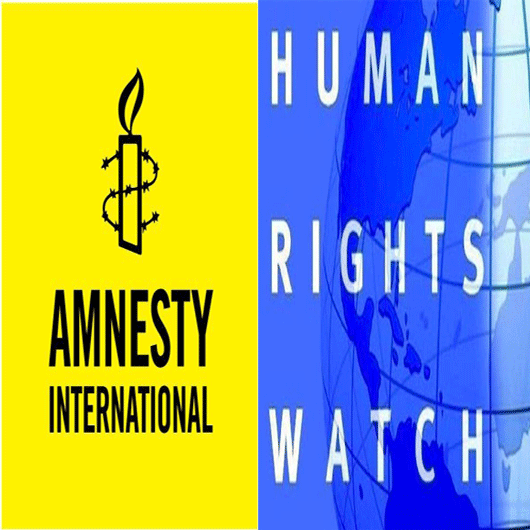
Local Editor
Two international human rights organizations on Wednesday called for Saudi Arabia to be suspended from the United Nations Human Rights Council over its conduct in the military campaign in Yemen.
In a joint statement, Amnesty International and Human Rights Watch said Saudi Arabia had committed "gross and systematic violations of human rights" during its two and a half years on the Human Rights Council. They said the Saudis had used their position to block independent investigations and criticisms of how the country has waged war in Yemen.
Saudi Arabia leads a coalition that has been accused of using cluster bombs and launching indiscriminate airstrikes against civilians in its battle against Houthi Ansarullah revolutionaries in neighboring Yemen. The U.N. High Commissioner for Human Rights has estimated that more than 3,500 civilians have been killed and 6,200 wounded since the war began in March 2015.
Saudi officials could not be reached for an immediate comment, but the U.S.-backed coalition repeatedly has denied targeting civilians, saying it acts only in response to truce violations by the rebels.
"We have assessed that the Saudis have crossed a threshold," said Richard Bennett, head of Amnesty International’s U.N. office, citing a council rule that member states can be suspended over particularly egregious human rights violations.
"They’ve done that in Yemen. They’ve done so domestically, and they’ve used their membership on the Human Rights Council to shield themselves from scrutiny. I can’t think of other members that have done that. Saudi Arabia is in a class of its own."
In October, Saudi Arabia and its allies on the Human Rights Council successfully resisted a proposed international inquiry into human rights violations by all parties in the Yemen conflict. Instead, it adopted a resolution supporting a decree by the Saudi-backed government of President Abed Rabbo Mansour Hadi, creating a national commission of inquiry. It asked the U.N. human rights office to offer "technical assistance" and help with "capacity building."
Earlier this month, the Saudi-led coalition was briefly placed on a list of countries that maim and kill children in conflicts. Also on the list were Yemeni government forces, the Houthi rebels and al-Qaeda in the Arabian Peninsula.
After a weekend of objections by Saudi Arabia and allies who fund U.N. humanitarian operations, Secretary General Ban Ki-moon told reporters that he had been subjected to "undue pressure" from countries that threatened to quit funding U.N. humanitarian work if he did not delete the coalition’s name.
"I also had to consider the very real prospect that millions of other children would suffer grievously if, as was suggested to me, countries would defund many U.N. programs," he said in explaining why he removed the coalition.
Last weekend, Ban was in Kuwait trying to rescue the off-and-on peace negotiations between the revolutionaries and the Hadi regime.
"While the cessation of hostilities is mostly holding, there have been serious violations, causing further casualties and suffering among the civilian population, including children," he said.
The joint statement said the human rights groups had documented 69 airstrikes that have hit homes, markets, hospitals, schools, businesses and mosques. It said some may amount to war crimes.
Hillel Neuer, head of a human rights group called UN Watch, said there is little likelihood Saudi Arabia will lose its seat, however.
"At this time, there’s zero chance," said Neuer, who has frequently criticized Saudi Arabia’s actions on the council and argued that human rights violators should be barred from serving on the council. "We’ve seen the power play Saudi Arabia’s demonstrated."
John Sifton, deputy Washington director of Human Rights Watch, said he hopes it will keep Saudi Arabia from being reelected when its term expires at the end of this year.
"We want to raise attention to the immense, catastrophic human costs of war in Yemen," Sifton said. "The Saudi military has engaged in a pattern of conduct that has led to excessive civilian casualties through its use of cluster bombings, indiscriminate and disproportionate attacks. Its record is bad."
Source: News Agencies, Edited by Website Team